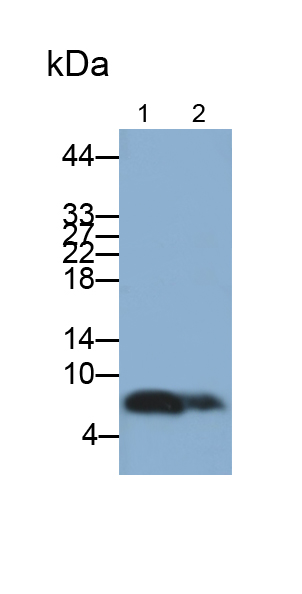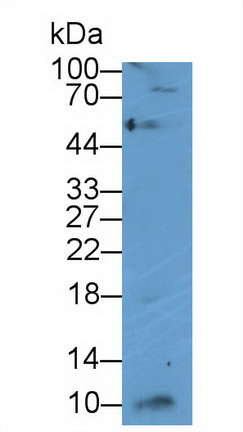Polyclonal Antibody to Interferon Gamma Induced Protein 10kDa (IP10) 

CXCL10; C7; IFI10; INP10; SCYB10; Crg2; GIP10; Mob1; Chemokine C-X-C Motif Ligand 10; Small Inducible Cytokine Subfamily B(Cys-X-Cys)Member 10
Overview
Properties
- Product No.PAA371Ca01
- Organism SpeciesCanis familiaris; Canine (Dog) Same name, Different species.
- ApplicationsWB
If the antibody is used in flow cytometry, please check FCM antibodies.
Research use only - DownloadInstruction Manual
- CategoryCytokineTumor immunityInfection immunity
- SourcePolyclonal antibody preparation, Host Rabbit
- Ig Type IgG, Potency n/a
- PurificationAntigen-specific affinity chromatography followed by Protein A affinity chromatography
- LabelNone
- Immunogen RPA371Ca01-Recombinant Interferon Gamma Induced Protein 10kDa (IP10)
- Buffer Formulation0.01M PBS, pH7.4, containing 0.05% Proclin-300, 50% glycerol.
- TraitsLiquid, Concentration 0.5mg/mL
Sign into your account
Share a new citation as an author
Upload your experimental result
Review

Contact us
Please fill in the blank.
Specifity
The antibody is a rabbit polyclonal antibody raised against IP10. It has been selected for its ability to recognize IP10 in immunohistochemical staining and western blotting.
Usage
Western blotting: 0.01-2µg/mL;
Optimal working dilutions must be determined by end user.
Storage
Store at 4°C for frequent use. Stored at -20°C in a manual defrost freezer for two year without detectable loss of activity. Avoid repeated freeze-thaw cycles.
Stability
The thermal stability is described by the loss rate. The loss rate was determined by accelerated thermal degradation test, that is, incubate the protein at 37°C for 48h, and no obvious degradation and precipitation were observed. The loss rate is less than 5% within the expiration date under appropriate storage condition.
Organism Species More: Mus musculus (Mouse)Giveaways
Increment services
-
 Antibody Labeling Customized Service
Antibody Labeling Customized Service
-
 Protein A/G Purification Column
Protein A/G Purification Column
-
 Staining Solution for Cells and Tissue
Staining Solution for Cells and Tissue
-
 Positive Control for Antibody
Positive Control for Antibody
-
 Tissue/Sections Customized Service
Tissue/Sections Customized Service
-
 Phosphorylated Antibody Customized Service
Phosphorylated Antibody Customized Service
-
 Western Blot (WB) Experiment Service
Western Blot (WB) Experiment Service
-
 Immunohistochemistry (IHC) Experiment Service
Immunohistochemistry (IHC) Experiment Service
-
 Immunocytochemistry (ICC) Experiment Service
Immunocytochemistry (ICC) Experiment Service
-
 Flow Cytometry (FCM) Experiment Service
Flow Cytometry (FCM) Experiment Service
-
 Immunoprecipitation (IP) Experiment Service
Immunoprecipitation (IP) Experiment Service
-
 Immunofluorescence (IF) Experiment Service
Immunofluorescence (IF) Experiment Service
-
 Buffer
Buffer
-
 DAB Chromogen Kit
DAB Chromogen Kit
-
 SABC Kit
SABC Kit
-
 Long-arm Biotin Labeling Kit
Long-arm Biotin Labeling Kit
-
 Real Time PCR Experimental Service
Real Time PCR Experimental Service
Citations
- Melatonin inhibits type 1 interferon signaling of toll-like receptor 4 via heme oxygenase-1 induction in hepatic ischemia/reperfusion.PubMed: 22288937
- Maternal circulating leukocytes display early chemotactic responsiveness during late gestationPubMed: PMC3561147
- Serum levels of selected chemokines in systemic lupus erythematosus patientsPubmed: 22461186
- The Immunosuppressant Protosappanin A Diminished Recipient T Cell Migration into Allograft via Inhibition of IP-10 in Rat Heart TransplantPubmed:24798458
- The G-Protein-Coupled Bile Acid Receptor Gpbar1 (TGR5) Inhibits Gastric Inflammation Through Antagonizing NF-κB Signaling PathwayPubMed: 26696888
- Hypoxia/ischemia promotes CXCL10 expression in cardiac microvascular endothelial cells by NFkB activationPubmed:26891076
- LPS alters the immuno-phenotype of glioma and glioma stem-like cells and induces in vivo antitumor immunity via TLR4.pubmed:28641579
- Serum biomarkers for predicting overall survival and early mortality in older patients with metastatic solid tumorsPubmed: 30952517
- Integrated Omics Reveals Tollip as an Aggravator and Therapeutic Target for Hepatic Ischemia‐Reperfusion Injury in MicePubmed: 31077413
- IL‑17A promotes CXCR2‑dependent angiogenesis in a mouse model of liver cancerPubmed: 31173199
- Inflammatory Responses of Astrocytes Are Independent from Lipocalin 2Pubmed: 32959226







